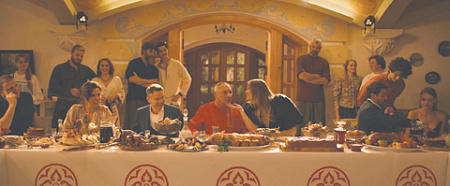
A new trend is captivating Russia’s urban youth, a rustic escape known as “izbing” or “derevening”—a flight from the metropolis to the quiet depths of the countryside. The internet is flooded with offers for village homes, with prices ranging from a modest sum to over a thousand dollars per night. These curated experiences, however, often take place in recently built, picture-perfect hamlets, where the traditional log cabins, or “izbas,” offer all the modern amenities of a boutique hotel.
This idealized vision of country life, often portrayed with a comedic touch in popular Russian films and TV series, is far removed from reality. Yet, the concept is not new. It echoes a long-standing tradition from the Soviet era, when the urban intelligentsia would spend their summers in villages, staying with relatives in a quest to connect with the “people” and the land. This romanticized escape was a recurring theme in Soviet culture, famously depicted in films like Andrei Smirnov’s 1974 classic, “Autumn.”
Inspired by a similar romantic notion in the late 1990s, I once embarked on my own “village life” adventure. I longed to escape the relentless pace of Moscow, to find solitude closer to nature. The plan was a 30-day retreat in a remote village. I packed a small suitcase, imagining a charming wooden cottage with ornate window frames. The reality that awaited me was a dilapidated, grey shack with boarded-up windows and a crooked door. The house had been abandoned for years, “preserved” by locals against thieves who stripped old homes for scrap metal.
The village itself was a skeleton of its former self. Once home to thirty families, only five or six elderly residents remained, the youth having long since departed for the city. Charred husks of burnt-down houses dotted the landscape, their reconstruction forgotten. My “izba,” one of the sturdiest left standing, hadn’t seen a renovation in a century. Inside, a giant Russian stove divided the single room, which held two sagging metal cots and a table. The porch served as a lavatory, equipped with a single galvanized bucket.
My idyllic dream quickly dissolved into a grueling struggle with an unfamiliar way of life. The hosts had left basic supplies, including a cast-iron pot and a “ukhvat”—a long-handled fork for maneuvering pots in the massive stove. I had only ever seen such a contraption in cartoons. My two attempts at traditional cooking nearly ended in injury and a fire. I quickly retreated to a portable electric stove once power was restored. The weekly mobile shop, our only source for bread and meat, was often blocked by rain-drenched roads, and the few remaining locals, while polite, kept their distance from city folk.
Everything became an irritant: the multiple daily trips to the well, the outdoor washbasin, the cackling roosters at 5 a.m., and the aggressive free-roaming livestock. But the silence was just as unnerving. Accustomed to the city’s late-night hum, I found the absolute stillness after 8 p.m. unbearable. With no radio, TV, or phone signal, my single book was finished in two nights. Fear crept in with the darkness; locals had warned of wolf tracks nearby, and every shadow in the forest seemed to hold a predator.
The final straw was a viper I nearly stepped on, sunning itself on my doorstep. In that moment of panic, seeing its black, beady eyes staring back, I was ready to walk back to Moscow. Luckily, my car had finally been repaired. My retreat was over. I packed in thirty minutes and have never looked back. The allure of “izbing” is powerful, but my ten-day ordeal serves as a stark reminder of the unvarnished truth that often lies behind the romantic fantasy of the rural Russian escape.
